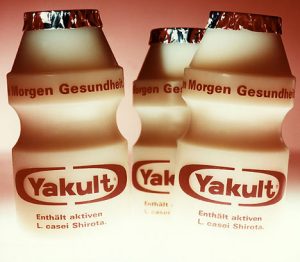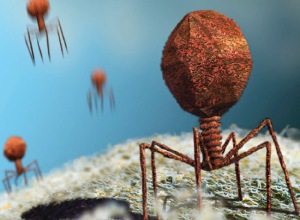That’s right. This post is about how you are not the person that you thought you were. In fact, you’re only about 10% the person that you thought you were.
This week, I have been delighted to play host to a rather nasty bug that seems to be doing the rounds at the moment. As well as feeling generally pants, I did also manage to rather spectacularly essentially get sick in my own eye. This was as unpleasant and painful as you might think.
Of course, when we say bug we’re not really referring to hemipteran insects (thanks, Wiki!). We actually mean some microbial infection (usually a virus when we talk about having bugs). So as I sat on the bathroom wondering if I’d washed my eye with enough bleach to truly sterilise it (Legal disclaimer: please, please don’t do this at home. At least, not in my home), I found myself hating our microbial cousins. However, once my vomit-vision had cleared up my hostility also vanished, and I decided to write this post about the “point” of bacteria and viruses. It’s not so much going to be about the general biology, but more about how they impact positively on us humans.
We tend to only think about viruses and bacteria when our relationship with them breaks down in some way, such as making us sick. The reality is that our bodies are a thriving community of many different organisms, and we owe our lives and our evolution to them. It is one of my favourite bio facts, and it brings me to that 10% figure I mentioned earlier. In the human body, microbial cells outnumber human cells by a factor of 10 to 1!! In many ways we are merely a walking-talking scaffold to support vast collections of bacteria, fungi and archaea. These coat your skin, mouth, nose, eyes and guts in their billions. This collection of bugs that everyone possesses is known as your natural microbial flora, although a more accurate term is microbiota as flora implies flowers and lovely things.
For most people, most of the time, we not only accommodate our microbiota without complaint, but we actually rely on it. One of the most important functions that our microscopic colleagues carry out for us is keep the nasty stuff at bay. The microbes that live in and on us are well adapted to our bodies as an environment. And this is important for our health as they make it more difficult for potential pathogens to infect us. All life is a competition for resources. As far as microbes are concerned, that’s what we are: a nice juicy collection of resources. Our native microbes are already well adapted to getting the most out of life on board and they are not too keen to give up their home comforts to interlopers. Our microbiota keep us well by out-competing intruders for the delights that our bodies hold.
This doesn’t just happen on the surface of our skin either. Microbes in our guts are enormously important too. They can have a dramatic effect on the development of our own immune system and prime it so that it is hostile to foreign invaders whilst leaving our allies in peace. In addition to the immune effects, indigenous microbes are crucial to our digestive system even working in the first place. You have so many microbes in your guts that up to 60% of the dry weight of poo is bacteria. Fun fact!
They help us to break down carbohydrates which we would be unable to process otherwise, and some proteins too. They help us absorb water (this is why you can get diarrhoea when you’re on antibiotics – they kill off some of the gut microbes too, so we absorb less water). They also can have a dramatic effect on the growth and development of our own cells that grow in the intestine, both directly and indirectly through the products of microbial metabolism.
Oh, whilst we’re on the subject… Probiotics. Yeah. There is no good reason to be buying and drinking products like Yakult, which is basically just off-milk. Unless you’re massively immunocompromised or you’ve had a massive dose of antibiotics, probiotics almost certainly do nothing except for tasting like a haunted yoghurt. If you’re currently alive and in good health, then it is safe to assume that you have a decent community of microbes in your gut. And the amount of “good” bacteria in these products is so small, relative to the massive amount in the established community in your guts that nothing is going to come of drinking them. It’s not just me saying this, by the way.
So, that’s the more obvious stuff about the “point” of bugs. You may well be familiar with some of what was discussed above to a lesser or greater degree. Now I want to talk about an even deeper relationship with microbes and how we literally would never have existed with them, particularly those of us who happen to be placental mammals (I’m assuming that covers anyone who is reading this…).
There is a suggestion that if it weren’t for viruses, placental mammals may not have been able to develop, or at least may have developed very differently. In a previous couple of posts I mentioned that a lot of our genome is non-coding DNA, which consists of numerous different elements. A reasonable proportion of this is actually DNA from viruses that infected our evolutionary ancestors. For any number of reasons, some of that DNA has been left behind and, over time, has become part of our genetic make up. These are called endogenous retroviruses (ERVs). In fact, possibly up to 90% of our genome has its origins in viral genetics.
There are many thousands of different types of ERVs. Some are similar to viruses that still exist today and some are basically genetic fossils, trapped inside the genomes of the species they used to infect. Different species will have varying ERVs and this actually allows us to draw evolutionary trees based upon ERVs. For example, chimps and humans might share a lot of ERVs due to having diverged relatively recently. But humans and geese would share many fewer.
More than just being a useful tool for investigating evolution, ERVs may have also played a role in the development of placental mammals. A key protein involved in the formation of the placenta is syncytin. Incredibly, it seems as though this important protein is coded for by DNA from an ERV called HERV-W. But there’s more. Most of the time, ERVs are pretty silent. However, during pregnancy the developing foetus and the placenta pump out tons of, what appear to be, viruses. It looks like a very heavy infection.
However, this is a normal part of pregnancy in all placental mammals. What is actually happening here? Rather than being a real viral infection, the foetus and the placenta are essentially mass-producing empty viral shells, using ERV DNA. They look like viruses but are really just hollow protein shells. And there’s a good reason for this. A developing foetus is not a joyous event, as far as the mother is concerned. Half of the genetic markers of the foetus are foreign (from the father) and the placenta develops in a way not at all dissimilar to a tumour. Accordingly the mother’s immune system will actively attack both the foreign invader and the apparent tumour. It is hypothesised that this sudden activation of ERVs during foetal development is a way of suppressing the maternal immune response. Without this sudden burst of virus-like activity it is probable that the foetus could not survive.
There’s absolutely loads more that I could say about our relationship with microbes but I guess I’ve wittered on enough for one post. The main point is that we are organisms that have evolved with and alongside microbes. Of course, our early ancestors were microbes. We don’t just put up with microbes. We rely on them for our very existence. Sometimes that relationship goes awry and we get ill, or worse. But the inescapable fact is that your body isn’t your body. It is a community of different organisms: viruses, bacteria, fungi and finally a very few human cells.
Mad stuff, eh?



I think everything said was actually very reasonable. But, think on this,
suppose you added a little content? I am not saying your information isn’t good, however suppose you added a post title to maybe get folk’s attention?
I mean Not As Human As You Think You Are | Sciencey Splurge is kinda
plain. You could glance at Yahoo’s home page and note how they write article titles to get people interested. You might add a related video or a pic or two to grab readers interested about everything’ve got to say.
In my opinion, it might bring your website a little livelier.
Quality posts is the main to invite the users to visit the web page, that’s what this site is providing.
I am truly happy to read this weblog posts which consists of lots of
valuable facts, thanks for providing these kinds of statistics.